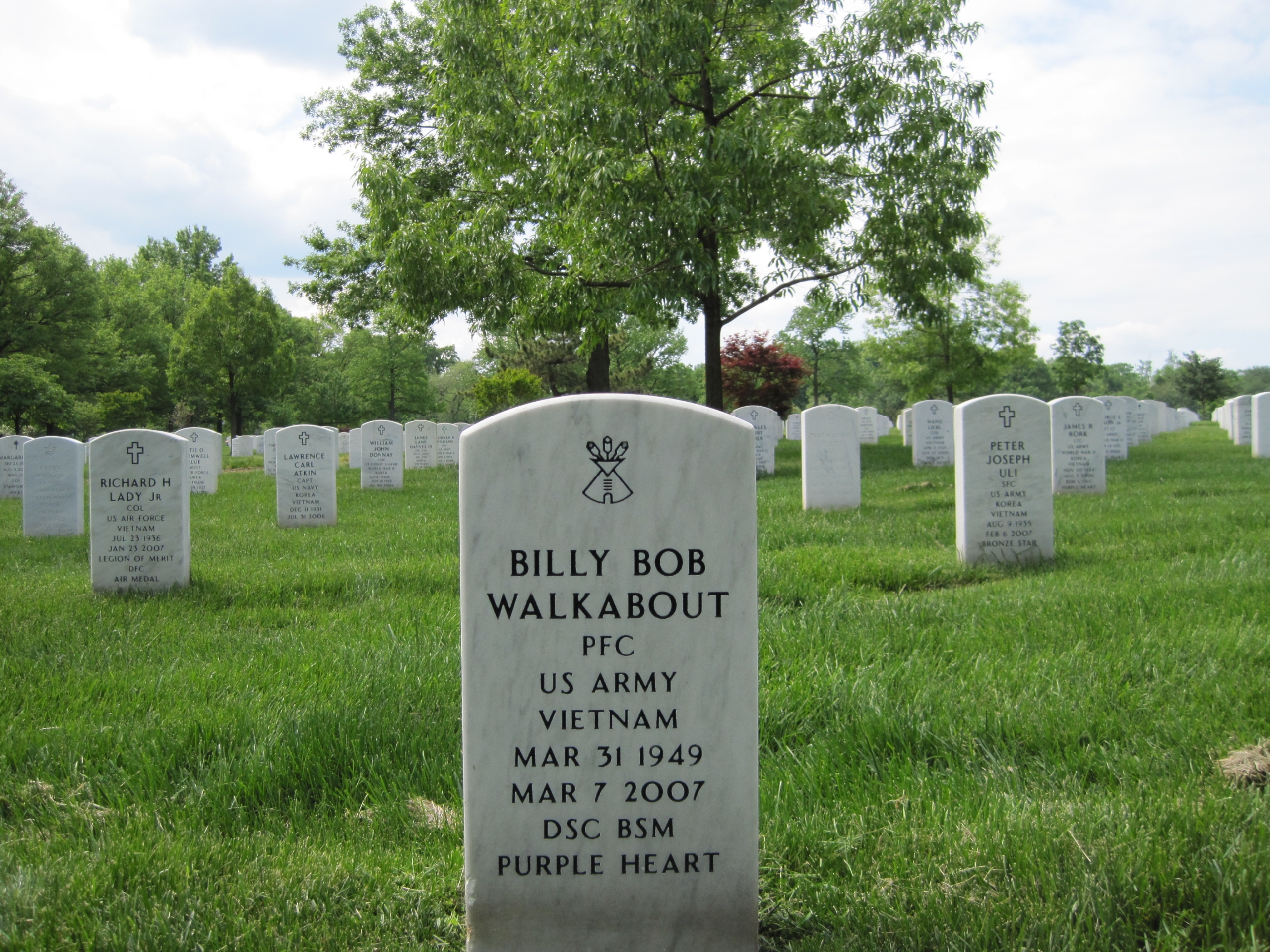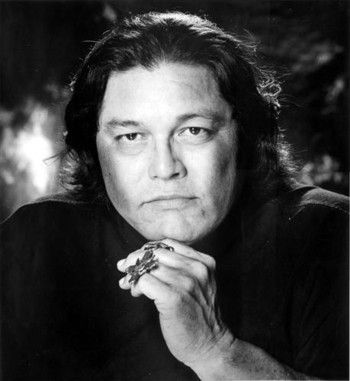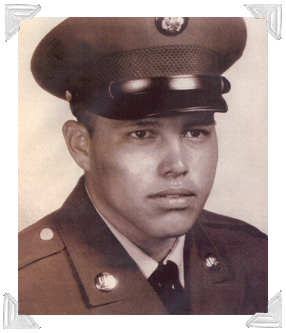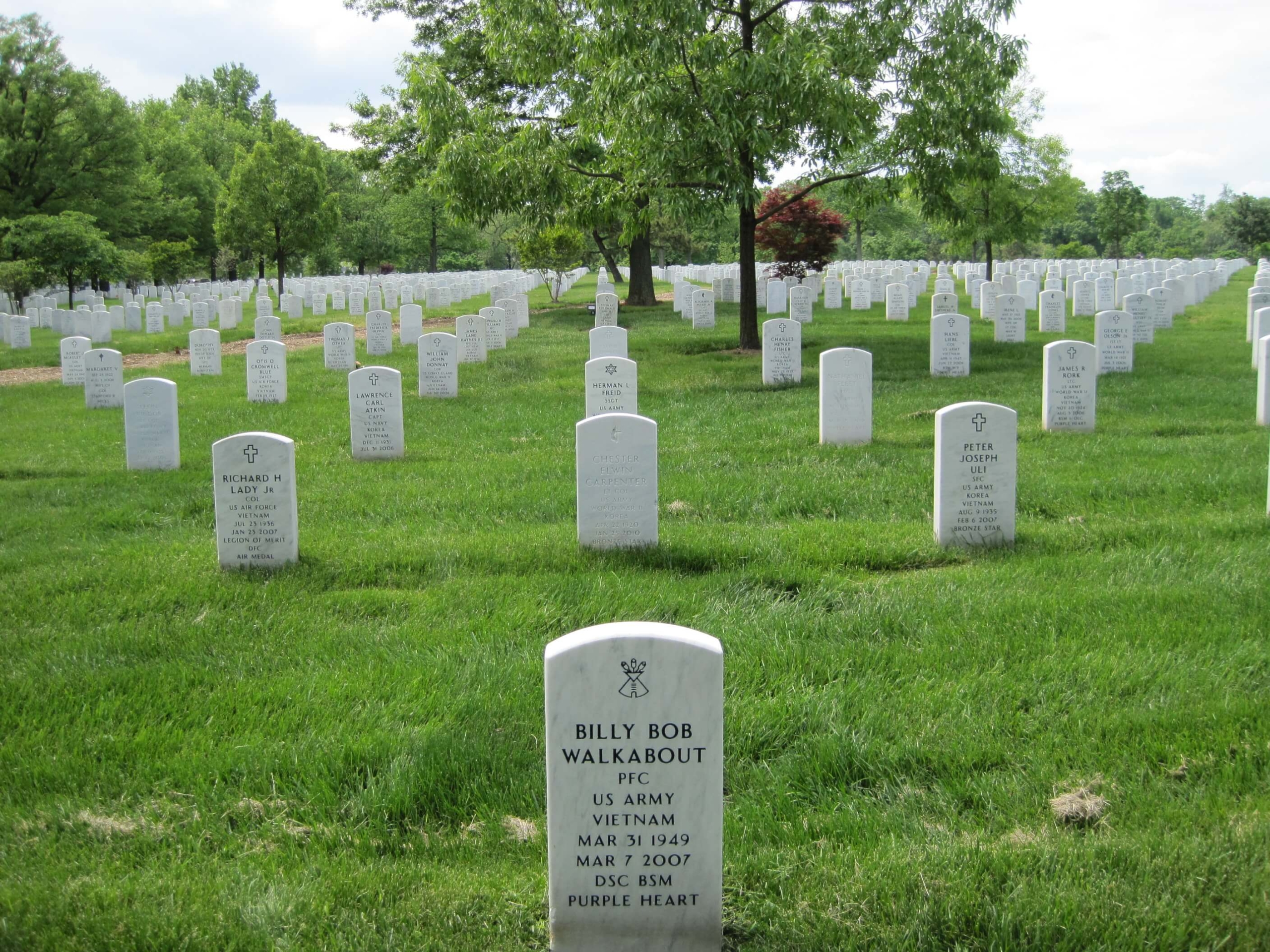WALKABOUT, BILLY B.
Sergeant, United States Army
Company F, 58th Infantry Regiment, 101st Airborne Division
Date of Action: November 20, 1968
Headquarters, United States Army, Vietnam, General Orders No. 3945 (1969)
Citation:
The Distinguished Service Cross is presented to Billy B. Walkabout, Sergeant, United States Army, for extraordinary heroism in connection with military operations involving conflict with an armed hostile force in the Republic of Vietnam, while serving with Company F, 58th Infantry, 101st Airborne Division (Airmobile).
Sergeant Walkabout (then Specialist Four) distinguished himself by exceptionally valorous actions on 20 November 1968 during a long range reconnaissance patrol southwest of Hue.
After successfully ambushing an enemy squad on a jungle trail, the friendly patrol radioed for immediate helicopter extraction. When the extraction helicopters arrived and the lead man began moving toward the pick-up zone, he was seriously wounded by hostile automatic weapons fire. Sergeant Walkabout quickly rose to his feet and delivered steady suppressive fire on the attackers while other team members pulled the wounded man back to their ranks. Sergeant Walkabout then administered first aid to the solider in preparation for medical evacuation. As the man was being loaded onto the evacuation helicopter, enemy elements again attacked the team.
Maneuvering under heavy fire, Sergeant Walkabout positioned himself where the enemy were concentrating their assault and placed continuous rifle fire on the adversary. A command-detonated mine ripped through the friendly team, instantly killing three men and wounding all the others. Although stunned and wounded by the blast, Sergeant Walkabout rushed from man to man administering first aid, bandaging one soldier’s severe chest wound and reviving another soldier by heart massage. He then coordinated gunship and tactical air strikes on the enemy’s positions. When evacuation helicopters arrived again, he worked single-handedly under fire to board his disabled comrades. Only when the casualties had been evacuated and friendly reinforcements had arrived, did he allow himself to be extracted.
Sergeant Walkabout’s extraordinary heroism and devotion to duty were in keeping with the highest traditions of the military service and reflect great credit upon himself, his unit, and the United States Army.
HQ US Army, Vietnam, General Orders No. 3945 (1969)
11 March 2007:
HARTFORD, Connecticut – Billy Walkabout, a native Cherokee whose actions in Vietnam made him among most decorated soldiers of the war, died March 7, 2007, his stepdaughter said Sunday. He was 57.
Walkabout received the Distinguished Service Cross, Purple Heart, five Silver Stars and five Bronze Stars. He was believed to be the most decorated Native American soldier of the Vietnam War, according to U.S. Department of Defense reports.
Walkabout, who lived in Montville, Cnnecticut, died of pneumonia and renal failure at a Norwich hospital, said his stepdaughter, Randi Johnson of Norwich.
He had experienced complications related to his exposure to the Agent Orange defoliant used during the Vietnam conflict, she said, and he had been on a kidney transplant waiting list and undergoing dialysis three times a week.
Walkabout, a Cherokee of the Blue Holley Clan, was an 18-year-old Army Ranger sergeant when he and 12 other soldiers were sent on an assassination mission behind enemy lines on November 20, 1968, in a region southwest of Hue.
However, they ended up in the enemy’s battalion area and came under fire for hours, during which he was seriously wounded. Several of the other 12 men were killed at the scene, while the rest later died of their injuries.
Walkabout’s citation for the Distinguished Service Cross said he simultaneously returned fire, helped his comrades and boarded other injured soldiers onto evacuation helicopters.
“Although stunned and wounded by the blast, Sergeant Walkabout rushed from man to man administering first aid, bandaging one soldier’s severe chest wound and reviving another soldier by heart massage,” the citation states.
In a 1986 interview with The Associated Press, Walkabout said his 23 months in Vietnam left him with disabling injuries and memories that refused to fade.
“War is not hell,” Walkabout said. “It’s worse.”
He said he struggled with failed marriages, thoughts of suicide and years of self-isolation when he would spend six months at a time alone.
Over the years, however, he found solace in the Native American powwows where he often was an honored guest.
At the time of his death, Walkabout and his wife, Juanita Medbury-Walkabout, lived in a portion of eastern Connecticut that is home to many American Indian tribal members.
His family is in the process of requesting a military burial at Arlington National Cemetery, Johnson said.
Billy Walkabout, decorated American Indian veteran, dies at 57
11 March 2007
Billy Walkabout, a native Cherokee whose actions in Vietnam made him among most decorated soldiers of the war, died March 7, 2007, at a hospital in Norwich, his stepdaughter said Sunday. He was 57.
Walkabout received the Distinguished Service Cross, Purple Heart, five Silver Stars and five Bronze Stars. He was believed to be the most decorated Native American soldier of the Vietnam War, according to U.S. Department of Defense reports.
Walkabout, who lived in Montville, died of pneumonia and renal failure, said his stepdaughter, Randi Johnson of Norwich.
He had experienced complications related to his exposure to the Agent Orange defoliant used during the Vietnam conflict, she said, and he had been on a kidney transplant waiting list and undergoing dialysis three times a week.
However, had not been seriously ill until his immunity weakened recently and he developed pneumonia, Johnson said.
Walkabout was born in Cherokee County, Oklahoma, on March 31, 1949, and lived much of his life in Oklahoma before moving to eastern Connecticut about seven years ago.
At the time of his death, Walkabout and his wife, Juanita Medbury-Walkabout, lived in a portion of eastern Connecticut that is home to many Mashantucket Pequot, Mohegan and other Native American tribal members.
Walkabout, a Cherokee of the Blue Holley Clan, was an 18-year-old Army Ranger sergeant when he and 12 other soldiers were sent on an assassination mission behind enemy lines on November 20, 1968, in a region southwest of Hue.
However, they ended up in the enemy’s battalion area and came under fire for hours, during which he was seriously wounded. Several of the other 12 men were killed at the scene, while the rest later died of their injuries.
Walkabout’s citation for the Distinguished Service Cross said he simultaneously returned fire, helped his comrades and boarded other injured soldiers onto evacuation helicopters.
“Although stunned and wounded by the blast, Sergeant Walkabout rushed from man to man administering first aid, bandaging one soldier’s severe chest wound and reviving another soldier by heart massage,” the citation states. “Only when the casualties had been evacuated and friendly reinforcements had arrived, did he allow himself to be evacuated.”
He retired at the rank of Second Lieutenant. In a 1986 interview with The Associated Press, Walkabout said his 23 months in Vietnam left him with disabling injuries and memories that refused to fade.
“War is not hell,” Walkabout said. “It’s worse.”
He said he struggled with failed marriages, thoughts of suicide and years of self-isolation when he would spend six months at a time alone.
“Everyone I went to high school with thought I was dead for years. They’re amazed when they see me and they say, ‘You’re not dead.”‘ Walkabout said.
He said he often refused to sleep near his wife, afraid he would strangle her in his sleep or try to push her under the bed to protect her from the bombs he imagined were going off.
Over the years, however, he found solace in the Native American powwows where he often was an honored guest, leading the traditional dances in time to the pounding drums and chant of the singers.
“I’m at peace with myself,” Walkabout said in 1986. “I’ve got my dignity and I’ve got my pride. … I never lost the war in Vietnam, I never lost a day of it. Even when I was wounded, I didn’t lose. When I fought, I won. I won my wars.”
Walkabout met his future wife, Juanita, when she was attending school in Oklahoma, and they moved to Connecticut after their marriage to be close to her family, Johnson said Sunday.
“They had that little bit of perfect for the short time they had together,” Johnson said of her mother and stepfather. “Although he was very private and traditional, he was a storyteller. He always told us he felt it was his duty and his honor to serve his country.”
Walkabout’s family and friends tended a round-the-clock fire in Montville after his death on Wednesday, and planned to extinguish it at midnight Sunday as part of a four-day Cherokee ceremony.
The smoke fire is believed to carry prayers to heaven and spiritual messages from place to place around the world, and to carry Walkabout’s soul back to the creator once the embers had cooled, Johnson said.
A memorial service is scheduled to take place Tuesday in Norwich. His family is in the process of requesting a military burial at Arlington National Cemetery, Johnson said.
11 March 2007:
Billy Bob Walkabout of 7 Dydo Drive, Uncasville, Connecticut, passed on 7 March 2007.
Billy was born into the Cherokee Nation on 31 March 1949 in Cherokee County Oklahoma. Billy was the son of Warren Walkabout and Bobby Jean Chaudoin Walkabout. He was married to Juanita Medbury-Walkabout on 3 April 2000.
Billy was a life member of the Military Order of the Purple Heart, Disabled American Veterans, Legion of Valor and the Veterans of Foreign Wars of the United States.
He is preceded in death by his Daughter Amy Rene, Father Warren Walkabout, Mother Bobby Jean, Brother James Henry, and Brother Warren Gene. Billy is survived by his wife Juanita, two son’s Justin and Trista Walkabout and his children, Autumn, twin boys David and Michael, Vivian and Abbey. Jason Knapp his daughters Madison and Emily, five step-children, Lisa her husband Peter Bernier, Mark McNicol, Donna her husband Andres Vasquez, Randi Johnson and Gregory Curtis, Randy his wife Debra McNicol and 9 grandchildren, Aimee, Corey, Michael, Stephanie, Magdelena, Madeline, Chrystal, Kevin and Andrew and one great-grandchild Haley and her Mother Sabrina. Billy is also survived by his Step-Father Jess Phillips Sr, Sister Michelle Cordial and Brother Jess Jr and his wife Twila and numerous Nieces and Nephews.
Billy honored himself, his family and the Cherokee Nation during the Vietnam War serving in Company F 58th Infantry, 101st Airborne Division, and was awarded many medals including the Distinguished Service Cross for his actions.
Calling hours will be held at Church and Allen Funeral Home, 136 Sachem Avenue, Norwich, Connecticut, from 2:00 PM to 4:00 PM, and 7:00 PM to 9:00 PM Monday, 12 March 2007. Memorial Services will be held at the same location at 11:01 AM Tuesday, March 13, 2007. Donations in memory of Billy Walkabout may be made to the National Kidney Foundation.
Intelligenta Indigena “If there was one Native soldier who earned the right for all Indians to be treated with respect it was this man.”
16 March 2007:
An Oklahoma native who was the most decorated American Indian soldier in the Vietnam War will be buried at Arlington National Cemetery next weekend, family members said.
Arrangements have been made for the March 26, 2007, burial of Billy Walkabout, 57, family members said. Several relatives and friends may travel to Arlington, Virginia, for the ceremony, Spencer resident Vincent Phillips, Walkabout’s nephew, told The Oklahoman’s Washington bureau.
Walkabout, a Cherokee, died last week in Connecticut, where he had lived for the past few years. He was born in Cherokee County.
Phillips, the son of Walkabout’s sister, said Walkabout joined the Army soon after graduating from U.S. Grant High School in Oklahoma City in 1968.
Walkabout spent 23 months in Vietnam. He was serving as an Army Ranger sergeant when he and about a dozen other U.S. soldiers came under heavy enemy fire.
Walkabout was wounded but continued to hold off the enemy while tending to his wounded comrades, relatives said. Walkabout earned the Distinguished Service Cross, five Silver Stars, five Bronze Stars and the Purple Heart.
According to a Defense Department publication, he was the most decorated Indian soldier in the war.
Walkabout’s father left the family when he was a boy, Phillips said, and his mother married Jess Phillips, who served in the Army. The family moved to Oklahoma City.
After the war, Walkabout split his time between Oklahoma City and Tahlequah, although he also lived in South Dakota for a while, Phillips said.
Phillips, a Navy veteran and electrician, said one of Walkabout’s sons is serving in the Army and another is an Army veteran.
NOTE: In one recent example, the service record of Billy Walkabout, an Army veteran decorated for service in Vietnam, was exaggerated after he died March 7, 2007. Several organizations, including The Associated Press and VFW Magazine, reported initially that he received a Distinguished Service Cross, a Purple Heart, five Silver Stars and five Bronze Stars.
VFW Magazine ran a correction in its March 2008 issue stating that a check with the National Personnel Records Center revealed Walkabout actually received a Distinguished Service Cross upgraded from his single Silver Star, one Purple Heart, one Bronze Star and the Army Commendation Medal.
WALKABOUT, BILLY BOB
- PFC US ARMY
- VIETNAM
- DATE OF BIRTH: 03/31/1949
- DATE OF DEATH: 03/07/2007
- BURIED AT: SECTION 66 SITE 59
- ARLINGTON NATIONAL CEMETERY

Michael Robert Patterson was born in Arlington and is the son of a former officer of the US Army. So it was no wonder that sooner or later his interests drew him to American history and especially to American military history. Many of his articles can be found on renowned portals like the New York Times, Washingtonpost or Wikipedia.
Reviewed by: Michael Howard



